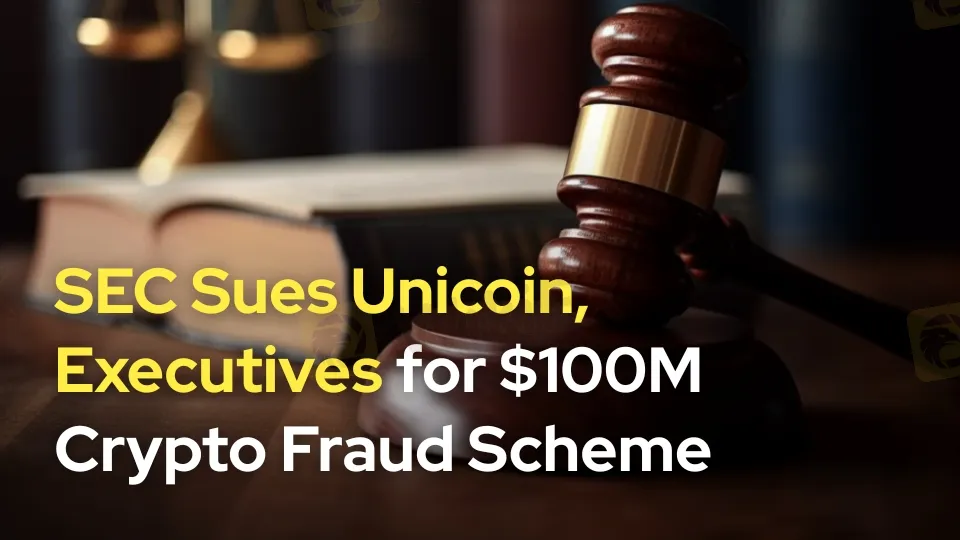SEC Sues Unicoin, Executives for $100M Crypto Fraud Scheme
Abstract:SEC charges Unicoin and executives with $100M fraud, alleging fake real estate backing and inflated token sale claims. Lawsuit seeks penalties.

On Tuesday, the U.S. Securities and Exchange Commission (SEC) launched a lawsuit against Unicoin, a cryptocurrency company, and three of its leaders, accusing them of a scam that tricked investors out of over $100 million. The SEC pointed fingers at Unicoins CEO Alexander Konanykhin, former board chair Maria Moschini, senior vice president and lawyer Richard Devlin, and former investment officer Alejandro Dominguez, saying they broke securities laws.
The SECs court filing claims Unicoin lied about owning real estate to back its crypto tokens. From September 2023 to January 2024, the company bragged about buying properties in Argentina, Thailand, Antigua, and the Bahamas, saying they were worth over $1.4 billion. The SEC says most of these deals never happened, and the properties were worth only about $300 million. This made investors think their money was safer than it was.

The SEC also says Unicoin fudged its fundraising numbers. The company told people it raised $3 billion by selling “rights certificates” by June 2024, but it only collected $110 million. The executives allegedly hyped up these false numbers on social media and elsewhere to make Unicoin seem more successful and draw in more investors.
Unicoin‘s marketing was flashy and bold. The SEC noted ads on taxis, ferries, elevator screens in office buildings, digital billboards, drink coasters, TV shows, news sites, and even public Wi-Fi spots. These ads promised huge profits, with some claiming investors could make up to 9 million percent, comparing Unicoin to Bitcoin’s massive growth. Social media posts urged people to “jump in early with Unicoin,” hinting it could turn small investors into millionaires, just like Bitcoin did for some.
Trouble started brewing last December when Unicoin got a Wells notice from the SEC, then led by Chair Gary Gensler, warning of coming fraud charges. In April, Konanykhin wrote to Unicoin‘s shareholders, saying the company turned down an SEC offer to settle. He called it an “ultimatum” with demands he wouldn’t accept. In a CoinDesk interview, he claimed the SEC‘s investigation hurt Unicoin to the tune of billions, but didn’t share specifics.
Unicoin and its leaders havent commented on the latest lawsuit. Earlier this year, after a Wall Street Journal story, a spokesperson said Unicoin was the only crypto company fully registered, regulated, audited, and reporting publicly in the U.S., insisting it followed all rules. The SEC disagrees and wants the company to pay back profits and face fines for the alleged wrongdoing.
This case is part of a bigger push by regulators to crack down on crypto companies making shady promises or selling unregistered securities. It highlights the dangers investors face in the wild world of crypto, where big-return claims can hide serious lies. As the lawsuit moves forward, the SEC is determined to hold Unicoin and its bosses responsible for what it calls a planned effort to fool investors.

Read more

CySEC Targets Unlicensed Forex and Crypto Brokers
CySEC blacklists unlicensed brokers like admiralmarket.net in the forex and crypto markets. Strict new rules impose hefty fines. Verify brokers to stay safe.

Is Dupoin a “100% Scam Broker”?
Is Dupoin a “100% Scam Broker”? A trader shared the experience trading with Dupoin. In today’s article, we will offer you a comprehensive review of this broker so that you can have a close overall look at Dupoin.

Is Privacy in Crypto Coming to an End in the UK?
The United Kingdom is taking major steps to tighten control over cryptocurrency by introducing new tax reporting rules that will come into force on 1 January 2026. Under the new rules, crypto companies in the UK will have to collect and report full customer details for every transaction, no matter how small.

Unauthorized Investment Sites Targeting UK Users Exposed
Six trading platforms have been flagged for operating in the UK without authorization. Despite polished websites and claimed UK addresses, none are licensed—posing serious risks to investors.
WikiFX Broker
Latest News
FIBO Group Review 2025: Is This Forex Broker a Scam or Legit?
The RM300 Mistake That Cost Her RM19,050
HDFC BANK: Is This Indian Bank Worth Your Money?
Can these 10 Forex Brokers boost your money in 2025? Saxo, IB, eToro & More
Aurum Markets- Opportunity or Trap? Let's uncover
2025 FXPesa Latest Review
OANDA Japan Deletes Inactive Accounts, Urges Re-registration
M4Markets Review 2025: Is This Forex Broker a Scam or Trustworthy?
Stop Wasting Money on FX Courses! Learn Forex for Free- from Top Brokers
IG Group Set to Smash £1 billion Revenue Mark in FY2025
Rate Calc
